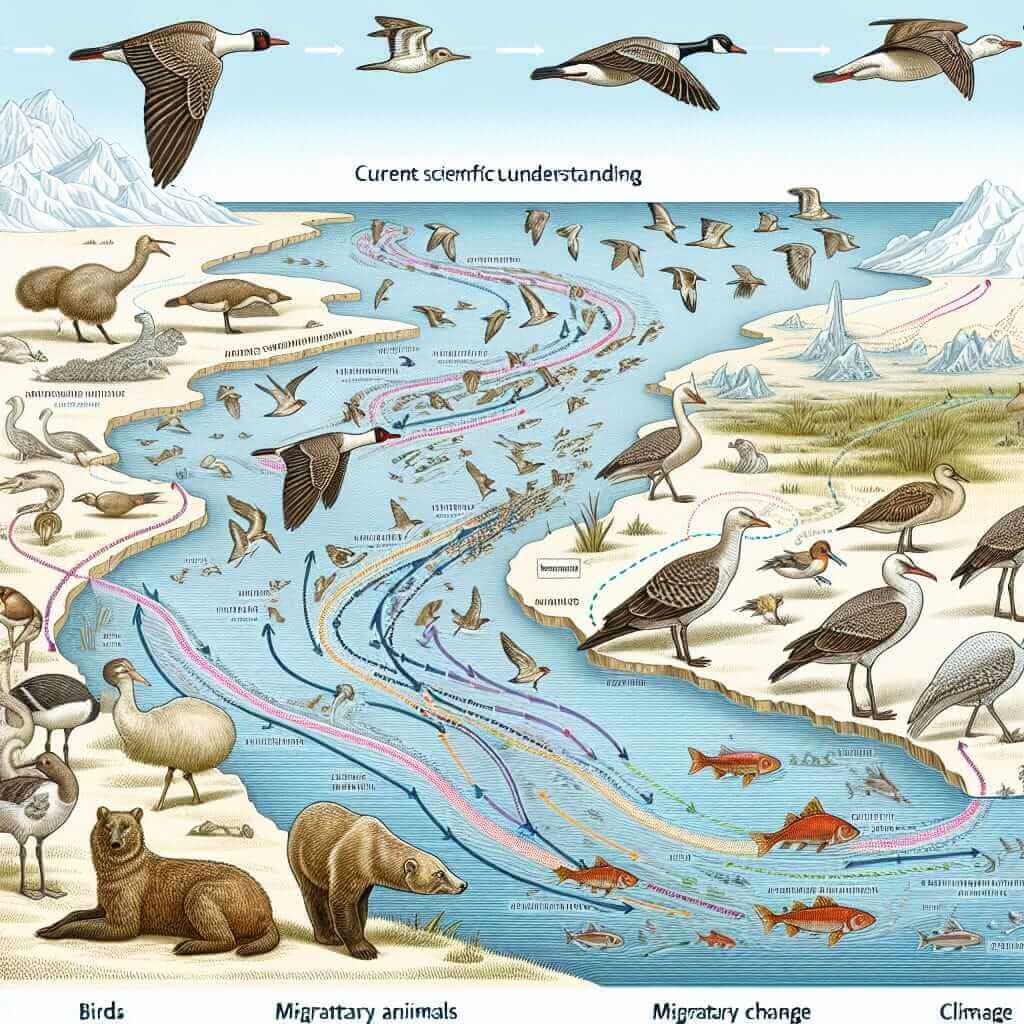The IELTS Reading section is one of the most challenging parts of the IELTS exam. It assesses a range of reading skills, including your ability to understand main ideas, details, inferences, and the writer’s opinions. In recent years, the impact of climate change on wildlife migration has become an increasingly prevalent and significant topic. This article aims to provide you with a detailed practice reading passage, relevant questions, and answers based on the IELTS format to help you prepare effectively.
Note: The theme “Impact of Climate Change on Wildlife Migration” is not only relevant to current global issues but is also a frequent topic in past IELTS exams. Understanding this can help you predict and prepare for similar topics in the future exams.
Practice Reading Passage: Impact of Climate Change on Wildlife Migration
Reading Passage
Migratory Patterns and Climate Change
The migratory patterns of wildlife are undergoing severe disruptions due to climate change. Various species that undertake long-distance migrations are being affected by the shifting climatic conditions, altering the availability of food, breeding grounds, and the timing of seasons.
Birds such as the Arctic Tern, which travels from the Arctic to the Antarctic, are significantly impacted. Rising temperatures in the Arctic lead to early melting of ice, disrupting the availability of nesting sites. Consequently, these birds must adjust their migratory routes, which often results in increased mortality due to longer travel distances and lack of food sources along the way.
Marine life, particularly fish species such as salmon, also faces peril due to climate change. Running rivers that serve as breeding grounds are drying up or warming to levels that are inhospitable for spawning. This not only affects the fish populations but also the ecosystems that depend on them. Additionally, changes in sea temperatures and acidity levels impact coral reefs, which serve as vital habitats for many marine organisms.
Large mammals like caribou are also feeling the effects of climate change. These animals rely on consistent seasonal changes to migrate between their summer and winter habitats. However, unpredictable weather patterns are causing difficulties in their migration. Early snowmelts or delayed freezes can result in caribou being exposed to predators and encountering food shortages.
Questions
Multiple Choice Questions
-
What is the primary cause of disruption in the migratory patterns of the Arctic Tern?
- A) Decrease in food supply in the Antarctic
- B) Melting of ice in the Arctic
- C) Increase of predators in the migratory route
- D) Rising sea levels
-
Which aspect of marine life is affected by climate change according to the passage?
- A) Breeding grounds
- B) Predatory behavior
- C) Marine ecosystem’s dependence
- D) Migration routes
Identifying Information (True/False/Not Given)
-
Climate change has led to the reduction of breeding grounds for salmon.
- True
- False
- Not Given
-
All large mammals are capable of adapting to the changes brought by climate change.
- True
- False
- Not Given
Answers
- B) Melting of ice in the Arctic
- Explanation: The passage mentions that the Arctic Tern’s migratory patterns are affected due to the early melting of ice in the Arctic.
- A) Breeding grounds
- Explanation: The passage specifies that climate change impacts the breeding grounds of fish species such as salmon.
- True
- Explanation: The passage clearly states that running rivers, which serve as breeding grounds for salmon, are affected by climate change.
- False
- Explanation: The passage discusses that large mammals like caribou face challenges due to climate change, implying not all can adapt effectively.
Common Errors and Tips
Common Errors
- Misinterpreting the Question: Ensure you understand what the question asks before attempting an answer.
- Scanning Ineffectively: Learn to quickly locate keywords in the passage rather than reading the entire text.
- Neglecting Passage Structure: Pay attention to how the passage is organized; this can help in quickly finding information.
Vocabulary
- Disruptions (noun /dɪsˈrʌpʃənz/): Interruptions in normal progress.
- Inhospitable (adjective /ɪnˈhɒspɪtəbl/): Unfriendly and unwelcoming, especially to visitors.
- Peril (noun /ˈperɪl/): Serious and immediate danger.
Grammar
- Cause and Effect Structures: Understanding how to identify and write cause and effect structures can be useful. Example: “Climate change is causing…”, “This results in…”
- Conditional Sentences: These are useful to express potential situations affected by climate change. Example: “If temperatures rise, migration patterns will change.”
Recommendations for High IELTS Reading Scores
- Practice Regularly: Consistent and targeted practice is key. Use authentic IELTS reading materials to gain familiarity with the test format.
- Develop Skimming and Scanning Skills: These techniques enable quick location of information and can save valuable time.
- Enhance Your Vocabulary: A rich vocabulary allows for a better understanding of complex passages. Use tools like flashcards to build your word bank.
- Understand the Question Types: Familiarize yourself with different question types and their corresponding strategies.
For additional related readings, consider exploring Effects of Climate Change on Human Migration, Effects of Climate Change on Biodiversity: Successful Wildlife Conservation Projects, and The Effects of Climate Change on Extreme Weather Events.

By following these tailored tips and practicing with relevant materials, you can significantly improve your reading skills and achieve a high score in the IELTS Reading section.